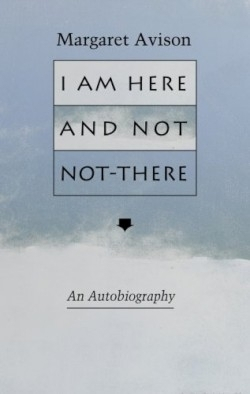I Am Here and Not Not-There
An Autobiography
To the question, “What makes a poet’s language distinctive?” Avison once ad-libbed, “Not just affection for words, which is common to all good writers; not necessarily a matter of cadence, formal structures, rhythmÂ…[but the realization] I am here and not not-there.” This attention to word and story, delivered with a pleasing humility, permeates Avison’s life story, I Am Here and Not Not-There. Avison died before finishing the book; her close friend and assistant, Joan Eichner, with editor Stan Dragland, completed the project, adding an appendix of essays, letters, and interviews. The result is an intimate portrait of one of Canada’s most beloved and well-known poets.
A minister’s daughter, Avison was brought up to be kind. Her grandmother told her, “You can learn something from everybody, something to do, or something not to do.” She suffered a teenage bout of anorexia nervosa and peer-group smoking and drinking, but later devoted her life to church missions and caring for her blind mother. She became an educated professor, but her primary identity was that of a poet.
Avison’s autobiography is filled with anecdotes about her poetry, day-to-day events, and people with whom she came in contact. She details childhood memories with an adult’s perspective; her topics range from family holidays in the snowy countryside to walking through interesting neighborhoods while living in Ontario, Saskatchewan, Alberta, Toronto, and Ottawa. She writes about both World Wars, the Great Depression of the 1930s, and her ongoing education—a B.A., M.A. and all courses for a doctorate—as well as her clerical, teaching, and editing jobs. She even visited France as a nanny. The poems based on these experiences, each written honestly and with the skill of a master, won her Canada’s literary honors and affection.
That affection was returned: Avison loved her home. In 1956, Avison won a Guggenheim Foundation Grant that took her to Chicago, where she organized decades of her poetry. She responded in amazement when her new friends suggested she become a U. S. citizen: “But I want to be back in Canada!”
The poet continued to follow early advice to eliminate the first person singular pronoun, and this characteristic humility remained a core part of Avison’s identity even as she received publishing honors: two Governor-General’s Awards, the Griffin Poetry Prize, and the Canadian Authors Association’s Jack Chalmers Award. In 2005, she accepted the Leslie K. Tarr Award for her prestigious Christian writing in Canada. Her most prestigious books include Winter Sun, sunblue, and No Time.
This is an enjoyable and educational autobiography of an accomplished artist, and a model for not only poets, but teachers and others dedicated to serving humankind.
Review Date: February 2010.
Reviewed by
Mary Popham
Disclosure: This article is not an endorsement, but a review. The publisher of this book provided free copies of the book and paid a small fee to have their book reviewed by a professional reviewer. Foreword Reviews and Clarion Reviews make no guarantee that the publisher will receive a positive review. Foreword Magazine, Inc. is disclosing this in accordance with the Federal Trade Commission’s 16 CFR, Part 255.

